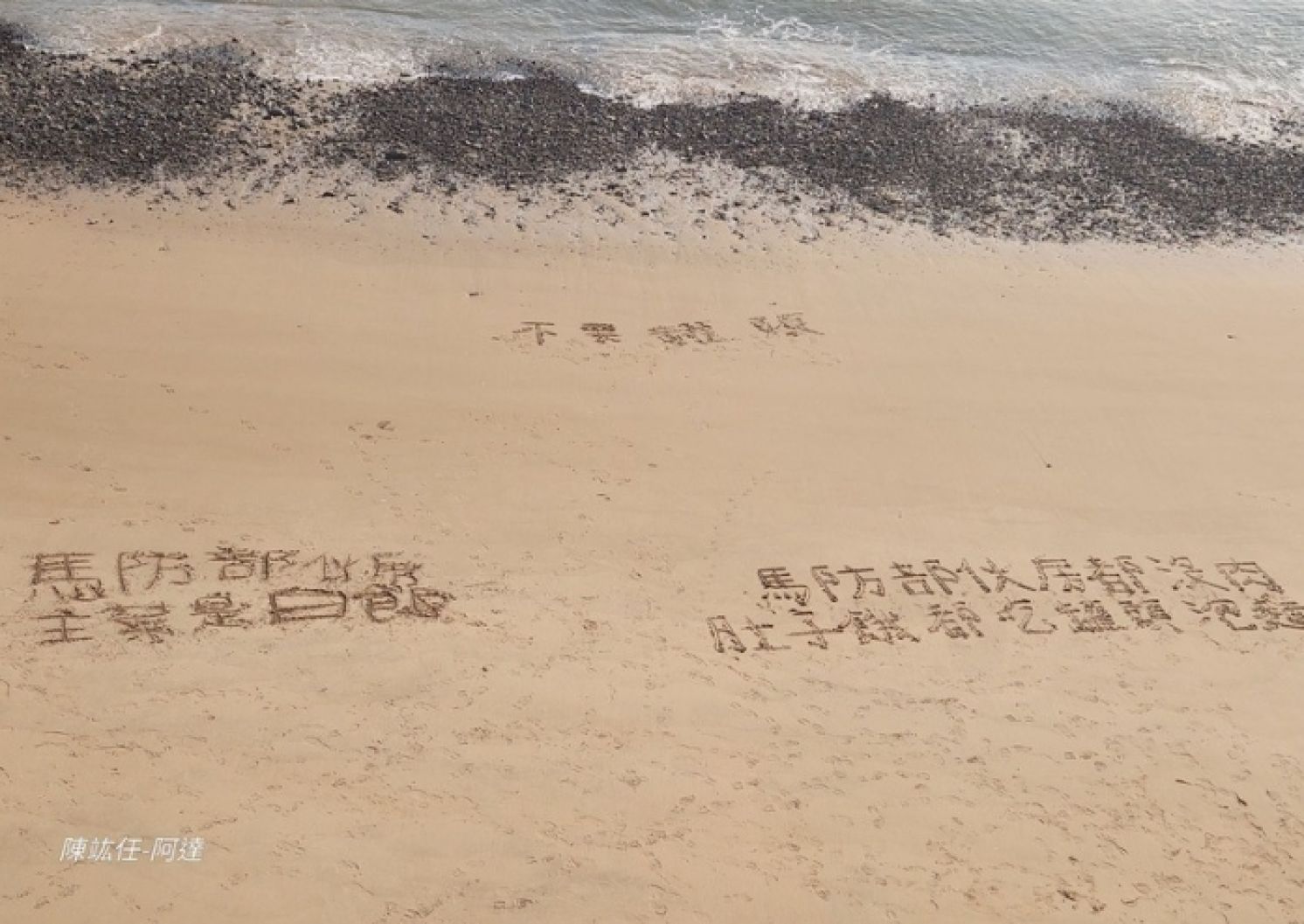
Leaking Secrets and Surrendering to Enemy:Why Did the Kinmen-Matsu Frontline Collapse?
By Lin Ting-yao
The Storm Media, March 11, 2023
It is shocking that a soldier originally stationed on the Erdan Islet in Kinmen was found to have deserted, and soldiers in Matsu wrote messages on the beach sand demanding meat for a lack of fresh meat in their meals. The two incidents coincided with mainland China's Two Sessions, which legally endorsed Xi Jinping's third term, and occurred at a time of a chilling relationship between the two sides of the Taiwan Strait. It is confusing to the public how the military discipline and morale of soldiers and officers could have degraded. The public is wondering why the Kinmen-Matsu defense line has collapsed with such serious incidents of secret leaking and betrayal.
This case involving a private first class surnamed Chen, a 26-year-old soldier stationed in Kinmen, should be considered a case of desertion. He has served in the Kinmen Defense Command for more than two years and was found missing during the morning roll call on March 9. Rumor has it that he deserted due to emotional and debt-related factors. He swam towards to the opposite side of Taiwan wearing a life jacket and was eventually plucked from the sea by the mainland Chinese Coast Guard in the median line of the Strait. Kuomintang (KMT) Legislator Chen Yu-chen believes that he is a deserter rather than a defector to Mainland China, and has called for the military to strengthen psychological counseling for soldiers and officers.
However, from Beijing's perspective, the handling of this soldier should be considered from a geopolitical point of view, rather than just based on cross-strait regulations. Currently, there are two related agreements between the two sides of the Taiwan Strait, the "Kinmen Agreement" for the repatriation of illegal immigrants and the "Cross-Strait Joint Crime-Fighting and Judicial Mutual Assistance Agreement" for criminal cases. Moreover, this case is not like that of non-governmental organization worker Lee Ming-che, who was charged with "subversion of state power" under China’s criminal law.
The fate of the soldier depends on the decision of the Beijing authorities. First, it is necessary to confirm whether he is an enemy or a friend. Second, the authorities should investigate his motives for defection. If his intention is to defect, he may be considered a hero by Beijing. If he is not politically motivated, he may be considered an enemy soldier and may be classified as a prisoner of war due to the current state of civil war between Beijing and Taipei.
It can be compared to the case of Lin Yi-fu, a former military officer stationed in Kinmen, who defected to China by swimming across the Strait. Lin transferred from the Department of Agricultural Engineering at National Taiwan University to the Military Academy to become a professional soldier. As a captain commanding a company, he swam from Ma Shan in Kinmen to Xiamen's Jiaoyu island carrying two basketballs and defected to mainland China in 1979. Later, Lin Yi-fu became a famous scholar in economics; he not only taught at Peking University but also served as the World Bank's Chief Economist and Vice President, making him a model figure in China's propaganda towards Taiwan. As the cross-strait exchanges resumed, he tried various means to return to Taiwan to attend his mother's funeral, triggering intense debates and criticism from the people of Taiwan.
There were also two Air Force pilots who defected separately to China in the 1980s. One was Air Force Major Huang Chi-cheng, who flew an F-5F fighter trainer to Fujian in 1981. He was later promoted to Air Force Major General and served as the president of the Huadu Air Force Academy in Guangdong, and then as the deputy chief of staff of the Beijing Military Region. The second was Air Force Lieutenant Colonel Lin Hsieh-shun, who flew an F-5E fighter jet to mainland China in 1989 because his family expenses were too high. And he also suspected that his superior officer had an affair with his wife. He was later promoted to the rank of Colonel Commandant in the Air Force, serving as the Assistant to the Chief of Staff of the Beijing Military Region. After retiring from the military, Huang and Lin both served as members of the Chinese People's Political Consultative Conference (CPPCC).
After all, military defection is a very sensitive topic between the two sides of the Taiwan Strait in the absence of a "mutual trust mechanism" or "Cross-Strait Peace Agreement", and there is a lack of rules to follow. The Democratic Progressive Party (DPP) administration has continued to oppose the concept of a cross-strait peace agreement. It has taken advantage of opportunities to gradually turn Taiwan into a porcupine island as China rescinded the “China-Tibet 17-Point Agreement” and enforced the "Hong Kong National Security Law."
It is embarrassing that the Armed Forces is currently facing many scandals, especially as Xi Jinping secures a historic third term as president and Chinese military aircraft and ships frequently cross the sensitive median line in the Taiwan Strait. What's even more embarrassing is that Japanese media and pundits have been making derogatory remarks about ROC military personnel and government officials, adding fuel to the fire.
It is unfortunate that military personnel on the front line are facing not only a shortage of supplies such as eggs and rations but also a lack of crisis awareness and alertness to the presence of the enemy. Despite the existence of the "1985" hotline for complaints, some soldiers are not satisfied with the substandard food rations and chose to express their complaints by writing "help" on the sand at a beach. The soldier surnamed Chen even defected by swimming to the other side, disregarding his oath of loyalty. With such poor discipline among the soldiers stationed in Kinmen and Matsu, how can they defend Taiwan?